Key takeaways:
- Dental anxiety often stems from past negative experiences, fear of pain, and a lack of control during dental procedures.
- Overcoming dental anxiety is crucial for maintaining oral health and improving overall quality of life.
- Effective strategies include bringing comforting items, openly communicating with dentists, and practicing deep breathing exercises.
- Preparation for dental visits, such as creating a checklist and establishing comfort through communication with staff, can alleviate anxiety.
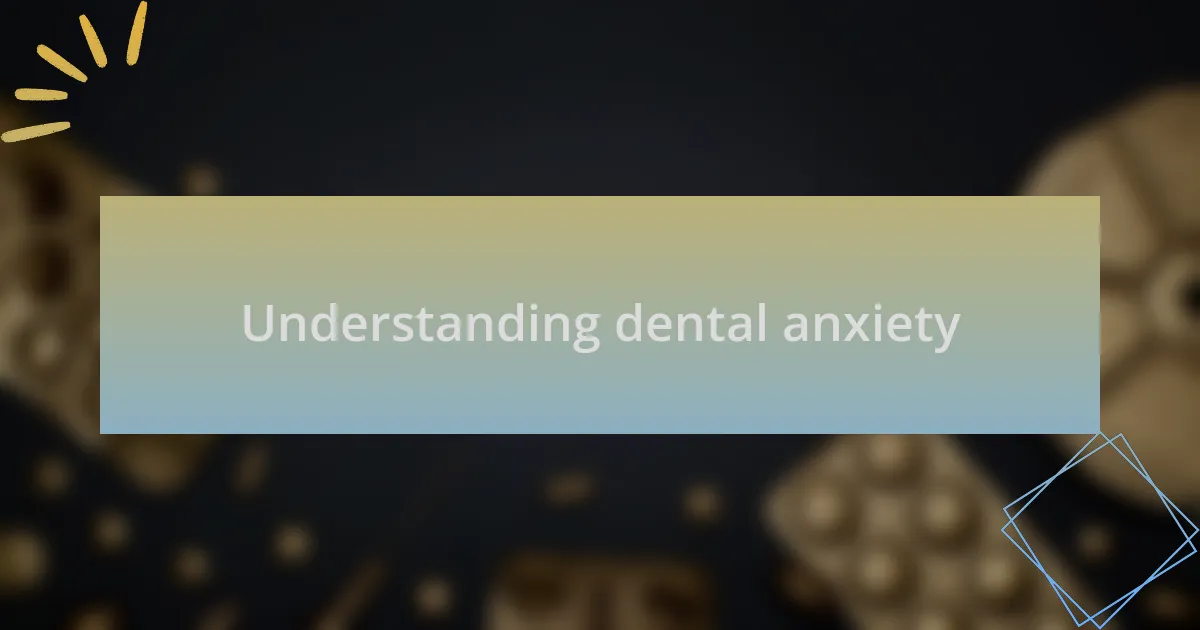
Understanding dental anxiety
Dental anxiety is a real challenge that many people face, and I can relate to that feeling of dread before an appointment. I remember sitting in the waiting room, my heart racing, thinking about every sound and sight associated with the dental chair. It made me wonder: why does something as routine as a dental visit feel so overwhelming?
Understanding the root causes of this fear is essential. For me, it stemmed from a childhood experience with a painful filling. Ever since, the thought of dental tools would send me spiraling into anxiety. It’s fascinating how a single moment can shape our perceptions for years to come.
Many individuals also struggle with the fear of the unknown. I often found myself worrying about what the dentist would find or what treatment I might need. It was this anticipation that made the whole experience feel incredibly daunting. Have you ever felt that way, too? I’ve learned that addressing these fears openly can help demystify the process and ease that anxiety.
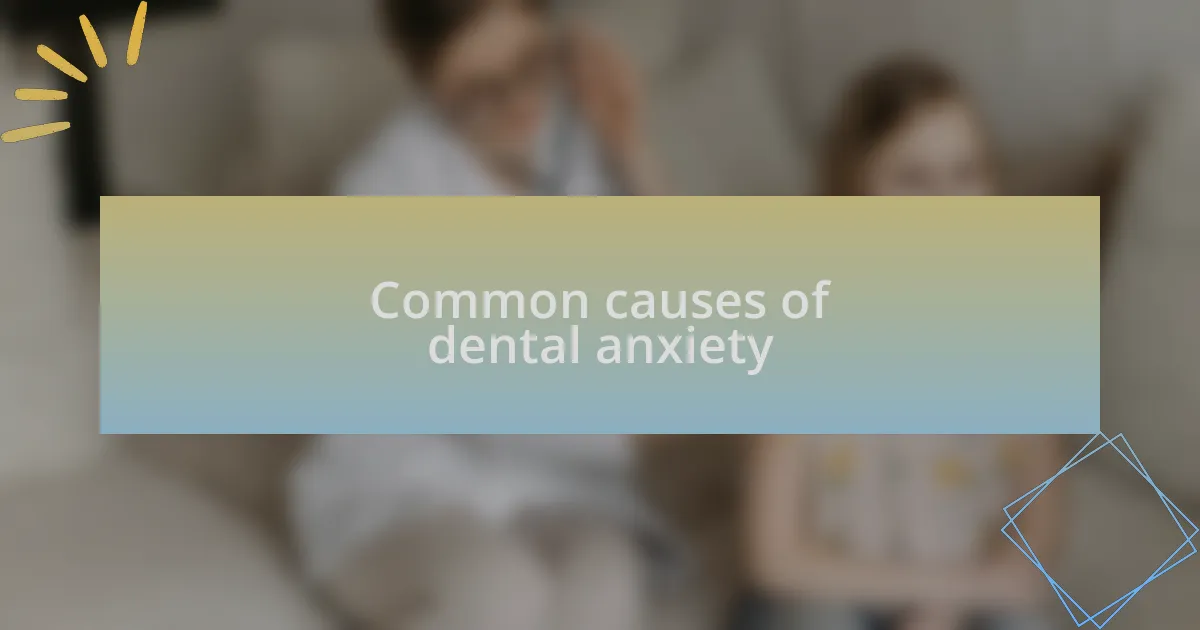
Common causes of dental anxiety
Many people experience dental anxiety due to a fear of pain. I vividly remember my first root canal; the anticipation of discomfort was almost unbearable. That lingering fear can transform a visit to the dentist into a nightmare, contributing to avoidance behavior that only deepens the anxiety cycle.
Another common cause is the feeling of lack of control during dental procedures. I often found myself trapped in that chair, feeling powerless as the dentist worked. Have you ever felt like you were just a passive participant in your own dental care? This can make it hard to relax and trust that things will go smoothly, increasing stress levels significantly.
Finally, past negative experiences play a crucial role in shaping dental anxiety. I recall a dental visit where a miscommunication led to a painful surprise. This kind of memory can haunt patients, making future visits feel like a gamble. How often do we let a single experience inform our opinions long after it has passed? Recognizing this can be a vital step in overcoming these fears, allowing us to move forward with confidence.
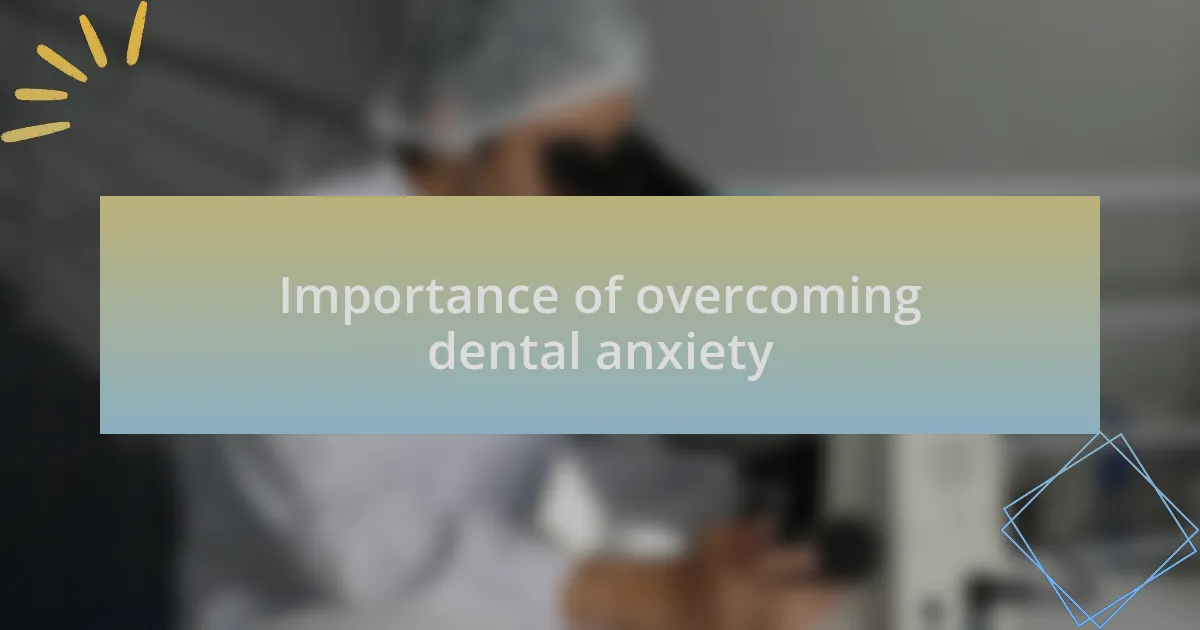
Importance of overcoming dental anxiety
Overcoming dental anxiety is essential for maintaining good oral health. I once avoided regular check-ups for years because I dreaded the thought of sitting in that chair. But, through determination, I learned that addressing my anxiety allowed me to prioritize my dental care, leading to a healthier smile and a more confident me.
Embracing dental visits means not just relief from anxiety but also an opportunity for preventive care. I remember the day I finally walked into the clinic without that heavy dread in my chest. Realizing that regular check-ups could prevent more severe issues helped me shift my perspective, transforming the dentist from a source of fear into a partner in my health journey.
Furthermore, overcoming this fear can significantly enhance one’s overall quality of life. The freedom to munch on whatever I fancy without worry about dental pain is liberating. Have you ever thought about how much joy that freedom can bring? It’s incredible how conquering a fear can open doors to new experiences, making life feel richer and more fulfilling.
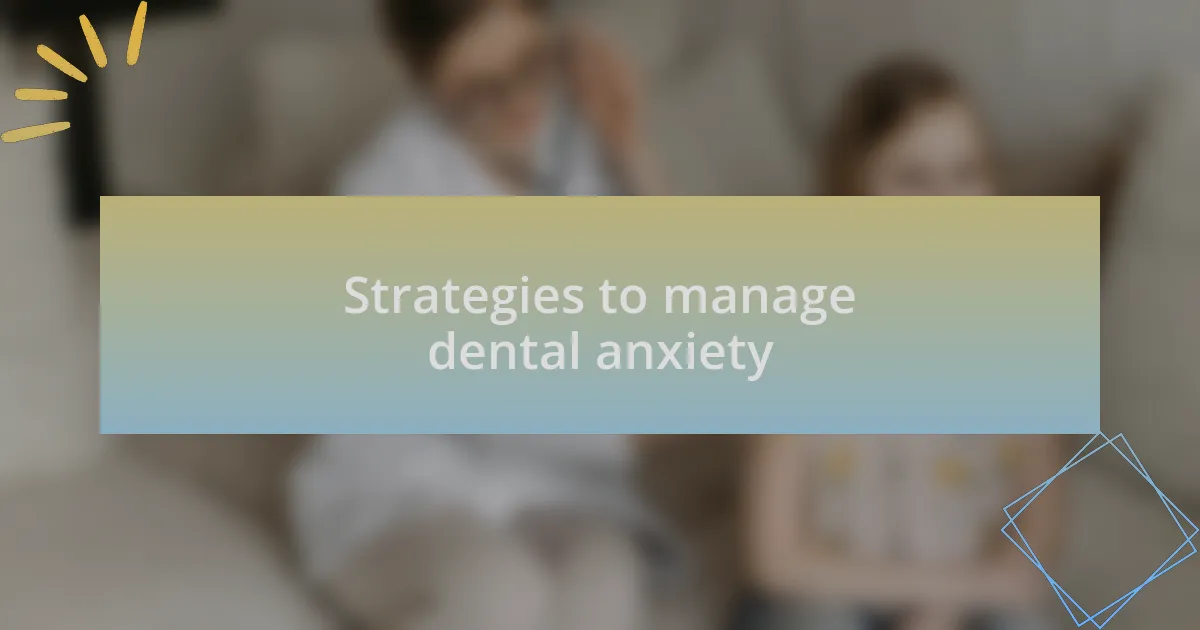
Strategies to manage dental anxiety
One effective strategy I found for managing dental anxiety is bringing along a comforting item, like a favorite book or a stress ball. During my visits, focusing on something familiar can act as a grounding technique, making the dental chair feel less daunting. Have you tried this? It’s a simple way to help distract from the sounds and sights of the clinic, turning those moments into more manageable experiences.
Additionally, discussing my fears openly with my dentist made a world of difference. I remember the first time I shared my anxiety; the dentist responded not just with understanding but by offering gentle techniques to ease the discomfort. This collaborative approach transformed my visits into a supportive environment, proving that communication can create a sense of safety in situations that once felt scary.
I also established a routine of deep breathing exercises before my appointments. Just sitting in the waiting room, I would take a few slow breaths, focusing on inhaling calmness and exhaling tension. This practice has become a vital pre-appointment ritual for me. Have you considered how a few intentional breaths can shift your mindset? It’s surprisingly effective in calming the nerves, allowing me to approach the dental chair with a much more positive outlook.
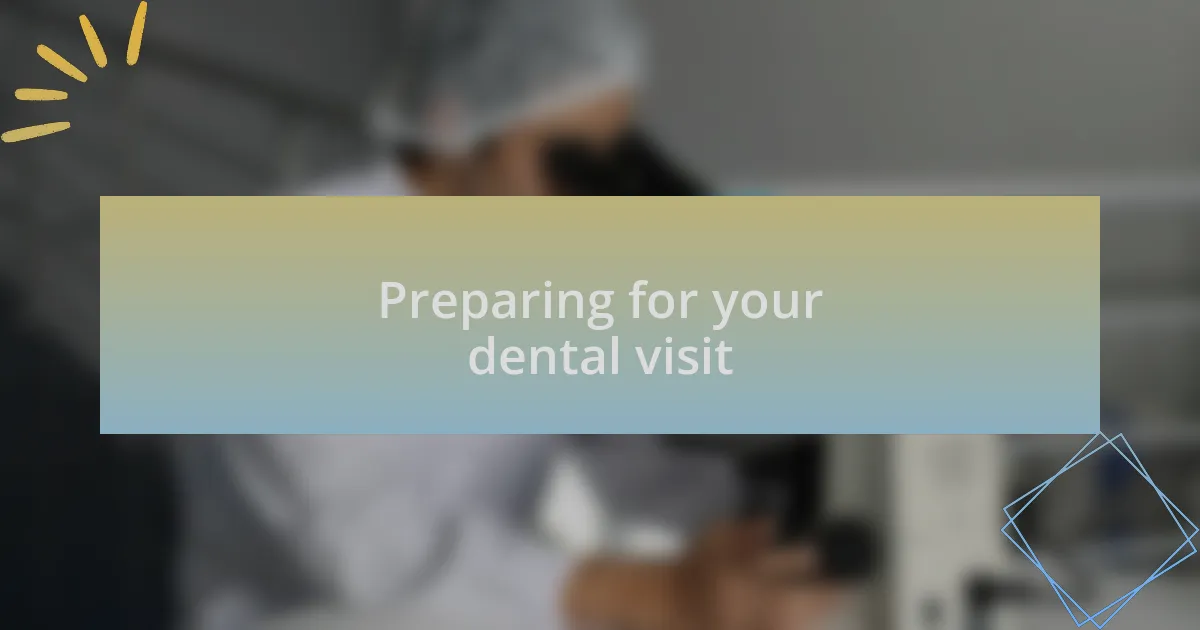
Preparing for your dental visit
Preparing for your dental visit involves more than just scheduling an appointment. I used to spend days dreading the visit, but I found that creating a checklist helped. By preparing everything in advance—like setting out my clothes and packing my bag with essentials—I felt a sense of control. This simple act shifted my focus from dread to preparation. Have you ever tried planning out your visit like this?
On the day of the appointment, I make it a point to arrive early. I found that walking into the clinic with extra time allows me to acclimate to the environment. I often sit in the waiting area, engaging in light conversation with the receptionist or browsing a magazine. This simple change in routine makes the experience feel less overwhelming. Doesn’t it feel nice when you can take a moment to just breathe before facing the dental chair?
Lastly, I learned to communicate my preferences with the dental team. Before my last visit, I mentioned I’d like to be informed of each step as it was happening. This transparency allowed me to feel more in control and less anxious about the unexpected. Have you thought about how your comfort level with the staff can transform your overall experience? That little conversation really turned things around for me.
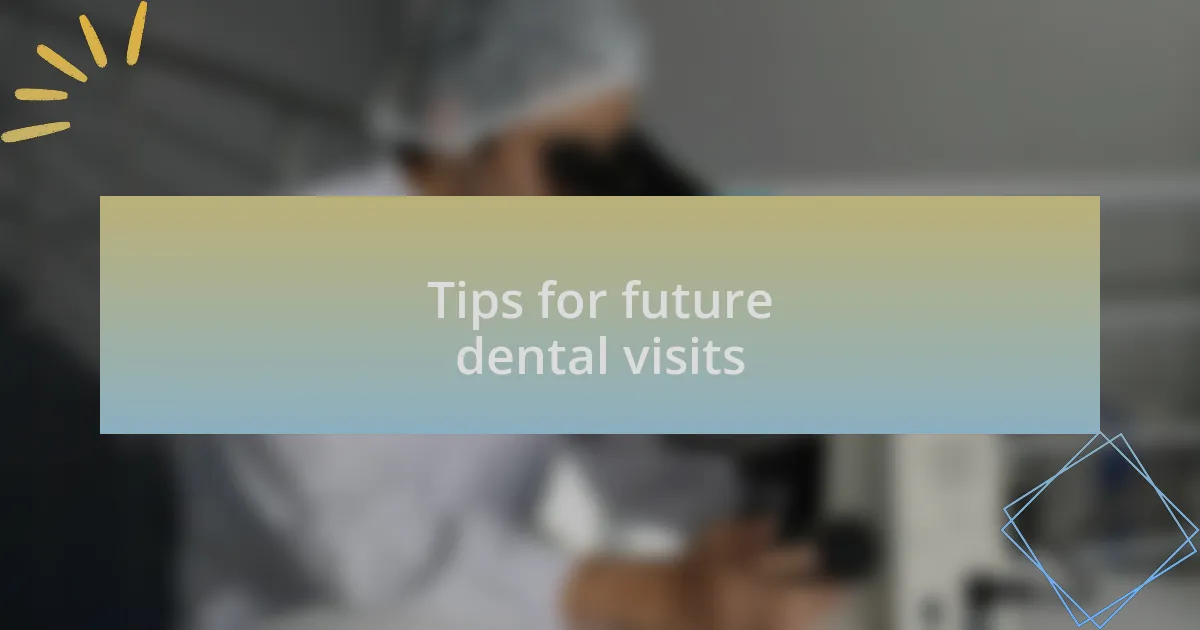
Tips for future dental visits
When preparing for your future dental visits, consider establishing a calming pre-appointment ritual. For me, this might mean indulging in a favorite cup of herbal tea or practicing a few minutes of deep breathing exercises before heading out. I’ve found that this routine not only positions me in a more relaxed state but also mentally primes me for the visit ahead. What small habits could you integrate to create a sense of peace before your appointment?
Another tip that has made a significant difference is bringing along a distraction. During my last visit, I played soft music through my earbuds while I waited. It created a comforting bubble around me, helping to drown out the clinical sounds that usually amplify my anxiety. Have you experienced how immersing yourself in music or a podcast can help shift your attention away from the dental environment?
Lastly, I recommend writing down any questions or concerns you have before the appointment. I did this once and handed my notes to the hygienist as she greeted me. To my surprise, it opened up a dialogue that revealed a lot about my treatment options, easing my worries. Have you thought about the power of simply voicing your concerns to your dental team? It can create an empowering environment where you feel heard and valued.